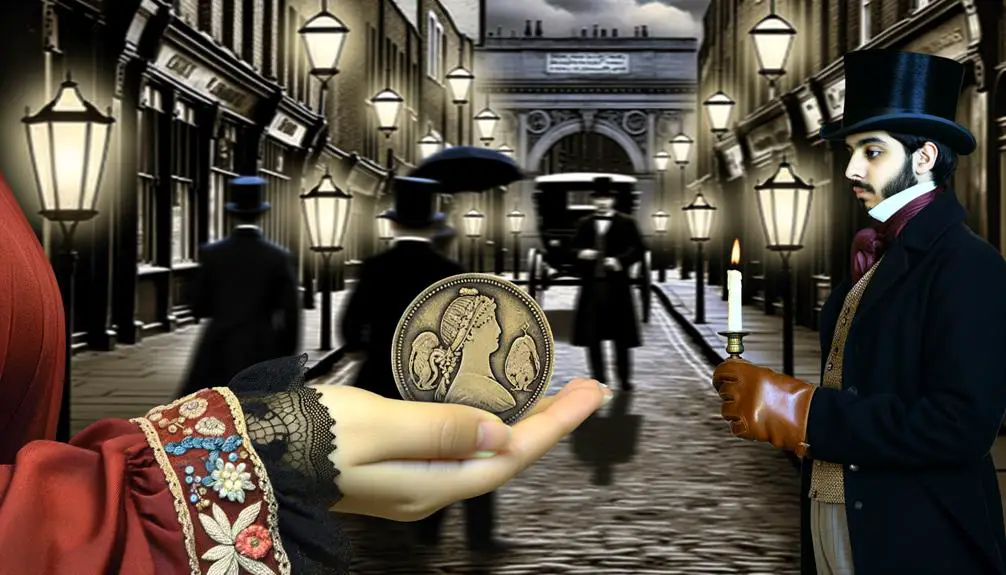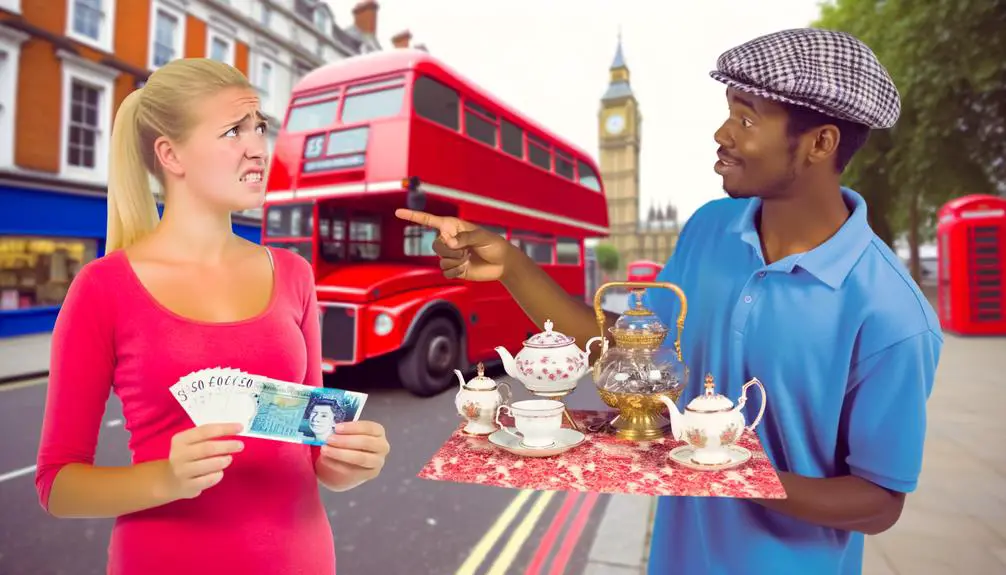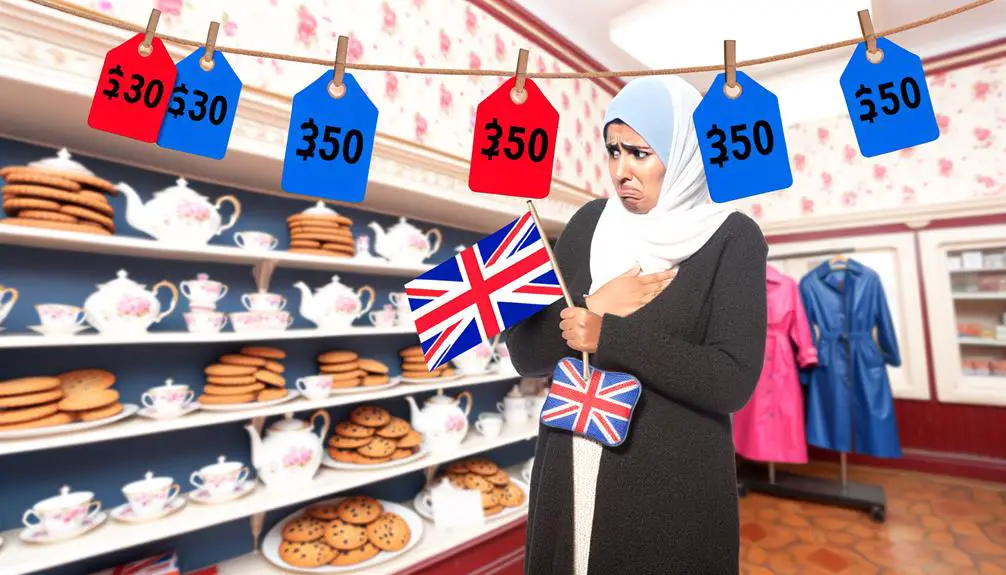In British slang, "dear" signifies more than affection; it denotes something expensive, reflecting its deep linguistic roots from "dēore," meaning valuable. This term, historically linked to high monetary and emotional value, has evolved. Now, it encapsulates the complexities of socio-economic status, luxury expenditures, and personal valuation in contemporary Britain. "Dear" challenges and reinforces social connections, illustrating the dynamic, evolving nature of language in expressing both wealth and worth. Its application extends across varying contexts, indicating items or services with hefty price tags, thereby highlighting economic trends and personal spending habits. Unpacking its nuanced meanings offers insight into British societal values and financial priorities.
Key Takeaways
- In British slang, 'dear' refers to something that is expensive or has a high cost.
- It signifies items or services perceived as luxurious or premium.
- The term is used to highlight the financial strain or high cost of living.
- 'Dear' in this context reflects economic trends and personal valuation of goods.
- It can indicate socio-economic status and spending habits on luxury items.
The Origins of 'Dear'

Historically, the term 'dear' has often been deeply rooted in English linguistic practices, evolving over time to encapsulate a range of nuanced meanings beyond its initial monetary connotation. Your etymology exploration will reveal that 'dear' originates from the Old English 'dēore,' which means precious, valuable, or costly. This linguistic root underscores the term's early association with a high monetary value, signifying something that is to be esteemed for its worth.
Delving further into its etymology, you'll discover that 'dear' gradually broadened in scope, transcending its material implications to embrace more abstract forms of value. This expansion reflects a linguistic evolution, where 'dear' starts to denote not just financial cost but also emotional significance. Such a shift illustrates the dynamic nature of language, how words stretch and adapt to capture the complexities of human experience.
In this scholarly pursuit, it's important to distinguish between 'dear's concrete origins in trade and commerce and its eventual migration towards expressing interpersonal affection and regard. This journey from the marketplace to the heart highlights the adaptability of language, where terms carry forward their historical baggage even as they acquire new, contextually enriched meanings.
'Dear' in Everyday Language
In contemporary discourse, 'dear' serves as a multifaceted term, seamlessly integrating into everyday language to express affection, endearment, or even mild frustration. This affectionate term carries with it layers of historical nuance and cultural context, allowing individuals to convey a range of emotions and relationships with a singular word. When you call someone 'dear', you're not just using a term of endearment; you're also attributing personal value to them, signifying their importance in your life. The use of 'dear' in this manner reflects an underlying structure of interpersonal relationships and social interactions within British culture, where language acts as a tool for both reinforcing and challenging existing social bonds.
Moreover, 'dear' transcends the boundaries of personal affection to embody moments of gentle reprimand or exasperation. When you say, "Oh dear," in response to a minor inconvenience or mishap, you're tapping into the term's ability to soften the impact of critique, wrapping it in a layer of empathetic understanding. This dual function of 'dear' highlights its significance in everyday language, making it a staple in the lexicon of affectionate and nuanced communication.
The Costly Side of 'Dear'

When you come across 'dear' in the context of British slang, it's important to acknowledge its implications on one's finances. This term often indicates that an item or service comes with a hefty price tag, potentially causing financial strain. Therefore, grasping the subtleties behind 'dear' can assist in maneuvering discussions and choices involving monetary considerations with greater acuity.
Pricey Implications
You'll find that the term 'dear' often signifies items or services that are considerably expensive, reflecting its nuanced role in British slang beyond mere endearment. This usage gives insight into not only personal valuation but also broader economic trends and luxury spending habits. When you hear something described as 'dear' in this scenario, it typically implies:
- The item or service carries a premium, suggesting it may be a luxury or of higher quality.
- There's an underlying economic trend where the cost of living or consumer goods is rising, making everyday items more 'dear.'
- An individual's willingness to engage in luxury spending, highlighting socio-economic status and financial priorities within society.
Understanding this aspect of 'dear' offers a lens into the complexities of language, economics, and social behavior.
Financial Strain Explained
Delving into the term 'dear' reveals a deeper layer of financial strain, illustrating how escalating costs impact both individual budgets and broader economic landscapes. This analysis underscores the necessity for adept budgeting tips and saving strategies as countermeasures. In the context of 'dear' signifying expensiveness, you're compelled to scrutinize your financial habits, prioritizing expenditures that align with essential needs over transient wants. Implementing saving strategies becomes paramount, not merely as a reactionary measure but as a proactive approach to financial health. By integrating budgeting tips—such as tracking expenses, setting realistic savings goals, and minimizing unnecessary spending—into daily routines, the financial strain associated with 'dear' items can be mitigated, fostering a more sustainable economic environment for individuals exploring the intricate dynamics of cost and value.
Regional Variations
You'll observe that the interpretation of 'dear' exhibits significant regional variations across the British Isles, reflecting diverse cultural influences. North vs. South differences highlight a geographical split in usage and connotation, while urban slang evolution showcases the dynamic nature of language in metropolitan areas. Additionally, Scottish and Welsh influences underscore the complexity of 'dear' within the broader context of British slang, indicating a rich tapestry of linguistic diversity.
North Vs. South Differences
When examining the regional variations in British slang, it becomes evident that the term 'dear' carries distinct connotations in the North compared to the South. This disparity is rooted deeply in local dialects and cultural perceptions, which shape the language's evolution and usage.
To understand the nuanced interpretations, consider the following:
- Local dialects: Northern dialects may infuse 'dear' with a warmth and familiarity, whereas Southern dialects might employ the term in more formal or even transactional contexts.
- Cultural perceptions: The North's communal ethos contrasts with the South's emphasis on individualism and formality, influencing the term's usage.
- Frequency of use: 'Dear' might appear more frequently in everyday conversation in the North, signifying a cultural propensity towards endearment.
These differences underscore the rich tapestry of British English, where a single word can reveal much about regional identities and social dynamics.
Urban Slang Evolution
As urban landscapes across the UK continue to evolve, so too does the slang that permeates these regions, reflecting a dynamic interplay of cultural and linguistic shifts. This transformation showcases language adaptability and the profound impact of cultural influences on regional dialects. The essence of urban slang evolution lies in its ability to encapsulate the complexities of modern urban life, marking a continuous dialogue between past traditions and contemporary realities.
| Region | Emotional Impact |
|---|---|
| London | Nostalgia, Pride |
| Manchester | Resilience, Unity |
| Liverpool | Grit, Identity |
| Birmingham | Diversity, Growth |
| Glasgow | Tenacity, Spirit |
Such variations not only highlight the rich tapestry of the UK's urban centers but also serve as a demonstration to the enduring nature of language as a vessel for communal identity and emotional expression.
Scottish, Welsh Influences
Exploring the regional variations, it's clear that Scottish and Welsh influences greatly enrich the tapestry of British slang, demonstrating a unique interplay of linguistic traditions and cultural heritage. These Celtic languages infuse British slang with distinctive cultural expressions, highlighting the diversity within the United Kingdom.
To understand this influence, consider the following:
- Celtic languages contribute a rich lexicon of words, infusing British slang with unique terms that reflect the historical depth of Scotland and Wales.
- Cultural expressions from these regions offer insights into local customs, attitudes, and values, enriching the overall British cultural mosaic.
- Linguistic traditions from Scotland and Wales preserve ancient forms of speech, ensuring their survival and continued influence in modern British slang.
This analysis underscores the importance of regional variations in shaping the linguistic landscape of the UK.
'Dear' in Popular Culture
The term 'dear' has permeated popular culture, often carrying nuanced meanings that reflect societal attitudes and values. When you examine the phrase 'dear diary', it's evident how deeply entrenched 'dear' is within personal and collective narratives. This invocation not only signifies the intimate confessions made within the pages of a diary but also highlights a broader cultural practice of seeking solace in written form. The diary becomes a 'dear' companion, embodying trust and secrecy in a world that's increasingly public and interconnected.
Moreover, the allure of 'dear' extends into the domain of celebrity endorsements, where its usage underscores both exclusivity and affection. When celebrities refer to their projects or endorsed products as 'dear' to them, it's a strategic move to humanize their brand, making it more relatable and appealing to the public. This tactic leverages the term's connotations of personal value and emotional investment, suggesting that the celebrity has a genuine connection with what they're promoting. Analyzing these contexts, it's clear that 'dear' in popular culture isn't just a term of endearment or a marker of cost; it's a versatile expression that bridges personal intimacy with broader societal trends.
Misunderstandings and Clarifications

In light of common misconceptions, it is vital to outline the multifaceted meanings of 'dear,' especially when maneuvering its application in diverse contexts. The term 'dear' in British slang embodies a complexity often overshadowed by cultural perceptions and language barriers. To navigate these misunderstandings, it is important to acknowledge:
- Cultural Perceptions: 'Dear' can signify affection or endearment in many cultures, but in British English, it also conveys a sense of value, both monetary and sentimental. The failure to recognize this dual usage can lead to misinterpretations, especially among those not familiar with British colloquialisms.
- Language Barriers: For non-native speakers, the subtleties of 'dear' in different registers of English can be challenging. Its meaning shifts dramatically depending on context, from formal to informal settings, which is a common source of confusion.
- Contextual Nuances: Understanding whether 'dear' is used sarcastically, affectionately, or to denote high cost requires a keen sense of linguistic nuances. This is particularly true in spoken language, where tone and inflection play critical roles.
Navigating these layers demands a thorough understanding of British culture and language nuances, underscoring the importance of context in interpreting slang accurately.
Expanding Beyond Price
Beyond its association with monetary value, 'dear' explores a domain of emotional significance, often denoting deep affection or high esteem within interpersonal relationships. This term, when stripped of its fiscal implications, becomes imbued with a richness that transcends the tangible, pointing to the intangible worth of human connections. It is crucial to grasp that 'dear', in this scenario, is not just an adjective but a marker of emotional value, signifying that the person in reference holds a place of irreplaceable significance in the speaker's life.
In the intricacies of British slang, 'dear' as one of the affectionate terms, operates within a complex system of linguistic signs, where its meaning is contingent upon the relational dynamics between the speaker and the listener. This term, when employed, requires a nuanced understanding of the subtleties of human emotions and social cues. The use of 'dear' in such a manner is emblematic of the speaker's attempt to convey a depth of feeling that might otherwise remain inarticulate. As a result, 'dear' transcends its primary economic connotation, emerging as a pivotal linguistic tool in articulating the profound emotional landscapes that define human relationships.







